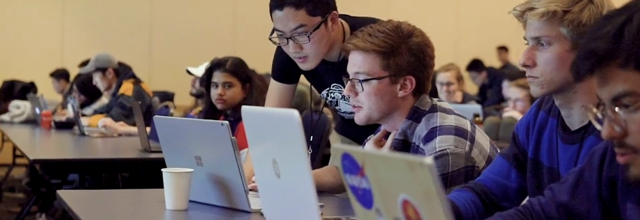
Bit Project Democratizing Technical Education
A UC Davis student noticed that some of his peers were struggling with the idea of learning to code. To help, he and other students began a group to produce educational materials that make STEM subjects accessible to other students, and Bit Project and their boot camps were born. At Twitter BitCamp, students learn to call the search endpoint of the Twitter API through the Python library Tweepy.
In Collaboration with

Challenge#
Daniel Kim, a student at UC Davis, noticed that some of his peers were struggling with the idea of learning to code. “A lot of my fellow students were very afraid of coding, thinking that because they weren’t STEM majors, it wasn’t for them. So I thought, if more students were introduced to coding in a different way, they would love it, too,” Kim explained. Then, he had the idea to establish an organization in which students could produce educational materials in STEM subjects specifically for other students. From there, he founded Bit Project alongside a group of friends during the summer of 2019.
Solution#
The Bit Project team created BitCamps, three-week boot camps that utilize interactive two-hour workshops to teach coding fundamentals to students with no prior experience. During BitCamps, students apply the skills they learn to complete projects that simulate real-world issues. All curricula used in BitCamps are developed and tested by Bit Project developers. BitCamps allow students to hone field-specific skills, such as using different coding languages, and universal soft skills applicable to all majors, such as critical thinking and transparent communication.
As part of the Twitter BitCamp, students learned to call the search endpoint of the Twitter API through the Python library Tweepy. The combination takes complicated API concepts and makes them easier for users. It hides some of the more complex calls and cURL commands, which let students focus on asking in-depth questions and analyzing the results.

Once students were comfortable with the basics of data science and using Python and Twitter endpoints, they moved on to the basics of data visualization and using data visualization libraries. Students picked their weekly tasks from a variety of projects based on their interests.
BitCamp focuses on teaching with the Twitter endpoints because of the prominence of the platform, and the real-time information available for analysis via API. Tweets are short and easy to process, which makes data analysis and natural language processing great quick examples for learning.
Every three-week BitCamp runs on a gamified, project-based system that helps students work their way through the lessons and gives them incentives for progress. The structure helps students learn at their own pace, use resources like Stack Overflow to answer their questions, and ultimately learn to troubleshoot problems without the aid of teachers.
Results#
Bit Project defines success by how many students they can help get started with coding -- Two BitCamps have been held, and more are planned for later in 2020. All of the course materials are available for free on GitHub. Schools and student organizations anywhere can use the materials to kick off a BitCamp of their own at any time.